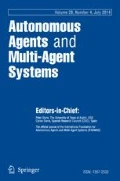Abstract
This paper addresses a simple but critical question: how can we create robust multi-agent systems out of the often unreliable agents and infrastructures we can expect to find in open systems contexts? We propose an approach to this problem based on distinct exception handling (EH) services that enact coordination protocol-specific but domain-independent strategies to monitor agent systems for problems (‘exceptions’) and intervene when necessary to avoid or resolve them. The value of this approach is demonstrated for the ‘agent death’ exception in the Contract Net protocol; we show through simulation that the EH service approach provides substantially improved performance compared to existing approaches in a way that is appropriate for open multi-agent systems.
Similar content being viewed by others
References
Proceedings of the International Workshop on Knowledge-Based Planning for Coalition Forces, Edinburgh, Scotland, 1999.
K. Fischer, et al., “Intelligent agents in virtual enterprises,” in Proceedings of the First International Conference on the Practical Application of Intelligent Agents and Multi-Agent Technology (PAAM'96), Blackpool, UK, 1996.
M. B. Tsvetovatyy, et al., “MAGMA: An agent-based virtual marketplace for electronic commerce,” Applied Artificial Intelligence, vol. 11, no.6, pp. 501–524, 1997.
N. R. Jennings, K. Sycara, and M. Wooldrige, “A roadmap of agent research and development,” Autonomus Agents and Multi-Agent Systems, vol. 1, pp. 275–306, 1998.
M. Wooldridge, N. R. Jennings, and D. Kinny, “A methodology for agent-oriented analysis and design,” in Proceedings of the Third Annual Conference on Autonomous Agents (AA-99), Seattle WA USA: ACM Press, 1999.
S. Hägg, “A sentinel approach to fault handling in multi-agent systems,” in Proceedings of the Fourth Pacific Rim International Conference on Artificial Intelligence (PRICAI'96), Cairns, Australia, 1996.
M. Youssefmir and B. Huberman, “Resource contention in multi-agent systems,” in First International Conference on Multi-Agent Systems (ICMAS-95), San Francisco, CA, USA: AAAI Press, 1995.
J. D. Sterman, Learning in and About Complex Systems, Alfred P. Sloan School of Management, Massachusetts Institute of Technology: Cambridge, Mass., 1994, 51.
M. H. Chia, D. E. Neiman, and V. R. Lesser, “Poaching and distraction in asynchronous agent activities,” in Proceedings of the Third International Conference on Multi-Agent Systems, Paris, France, 1998.
M. Waldrop, “Computers amplify black monday,” Science, vol. 238, pp. 602–604, 1987.
T. Sandholm, S. Sikka, and S. Norden, “Algorithms for optimizing leveled commitment contracts,” in Proceedings of IJCAI-99, Stockholm, Sweden, 1999.
T. R. Gruber, “A method for acquiring strategic knowledge,” Knowledge Acquisition, vol. 1, no.3, pp. 255–277, 1989.
J. A. Barnett, “How much is control knowledge worth? A primitive example,” Artificial Intelligence, vol. 22, no.1, pp. 77–89, 1984.
M. Klein, “Conflict resolution in cooperative design,” Ph.D. thesis, Computer Science, University of Illinois: Urbana-Champaign, IL, 1989.
M. Klein, “Supporting conflict resolution in cooperative design systems,” IEEE Systems Man and Cybernetics, vol. 21, no.6, pp. 1379–1390, 1991.
M. Klein, Exception Handling in Process Enactment Systems, MIT Center for Coordination Science: Cambridge MA, 1997.
M. Klein and C. Dellarocas, Domain-Independent Exception Handling Services That Increase Robustness in Open Multi-Agent Systems, Massachusetts Institute of Technology: Cambridge MA USA, 2000.
M. Klein and C. Dellarocas, Towards a Systematic Repository of Knowledge about Managing Multi-Agent System Exceptions, Massachusetts Institute of Technology: Cambridge MA USA, 2000.
R. G. Smith and R. Davis, “Distributed problem solving: The contract net approach,” in Proceedings of the 2nd National Conference of the Canadian Society for Computational Studies of Intelligence, 1978.
C. Dellarocas and M. Klein, “An experimental evaluation of domain-independent fault handling services in open multi-agent systems,” in Proceedings of The International Conference on Multi-Agent Systems (ICMAS-2000), Boston, MA, 2000.
J. Gray and A. Reuter, Transaction Processing: Concepts and Techniques, Morgan Kaufmann series in data management systems, Morgan Kaufmann Publishers. xxxii, 1070: San Mateo, Calif. USA, 1993.
S. Kumar, P. R. Cohen, and H. J. Levesque, “The adaptive agent architecture: Achieving fault-tolerance using persistent broker teams,” in International Conference on Multi-Agent Systems (ICMAS-2000), Boston MA USA, 2000.
N. Minar, et al., The Swarm Simulation System: A Toolkit for Building Multi-Agent Systems, Santa Fe Institute: Santa Fe, New Mexico, USA, 1996.
G. A. Kaminka and M. Tambe, “What is wrong with us? Improving robustness through social diagnosis,” in Proceedings of the 15th National Conference on Artificial Intelligence (AAAI-98), 1998.
M. Tambe, “Towards flexible teamwork,” Journal of Artificial Intelligence Research, vol. 7, pp. 83–124, 1997.
B. Horling, et al., Diagnosis as an Integral Part of Multi-Agent Adaptability, University of Massachussets at Amherst Department of Computer Science: Amherst, Massachussets, 1999.
M. Venkatraman and M. P. Singh, “Verifying compliance with commitment protocols: Enabling open web-based multiagent systems,” Autonomous Agents and Multi-Agent Systems, vol. 3, no.3, 1999.
A. Burns and A. Wellings, Real-Time Systems and Their Programming Languages, Addison-Wesley, 1996.
S. J. Mullender, Distributed Systems, second edition, ACM Press: New York, 1993.
Author information
Authors and Affiliations
Rights and permissions
About this article
Cite this article
Klein, M., Rodriguez-Aguilar, JA. & Dellarocas, C. Using Domain-Independent Exception Handling Services to Enable Robust Open Multi-Agent Systems: The Case of Agent Death. Autonomous Agents and Multi-Agent Systems 7, 179–189 (2003). https://doi.org/10.1023/A:1024145408578
Issue Date:
DOI: https://doi.org/10.1023/A:1024145408578



